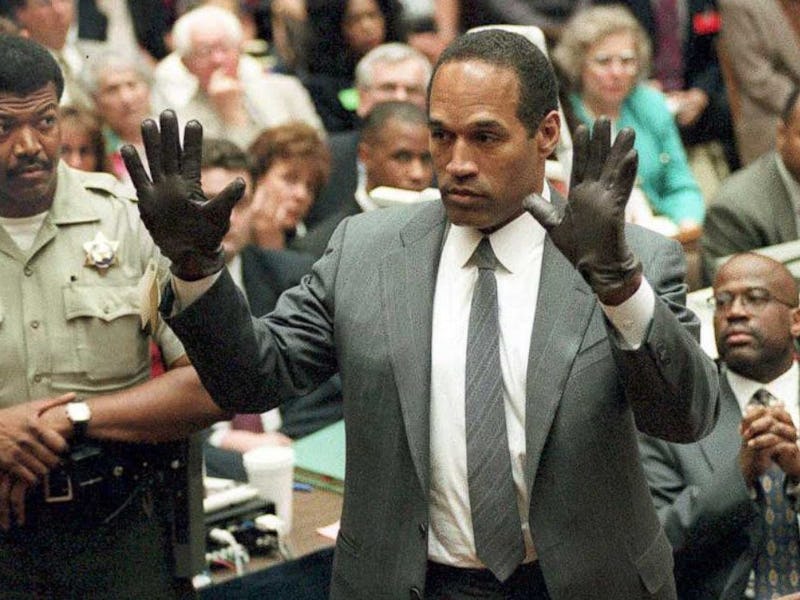The 'People v. O.J. Simpson' Really Was the Trial of the 20th Century
For better or worse, the O.J. Simpson trial changed everything.

Celebrity trials are nothing new. When silent movie star Fatty Arbuckle stood trial for the manslaughter of a young actress in the 1920s, Americans ate up splashy headlines like “Arbuckle Faces Gallows.” Yet, looking back now, the O.J. Simpson trial was an entirely different monster. In a way, the O.J. trial became the trial of the century not because it featured a famous ex-football star, but rather timing (two years after the 1992 Los Angeles Riots), location (Hollywood, baby!), a bizarre collection of lawyers and witnesses, and a judge who made arguably one of the most ill-fated decisions in the history of modern trial law.
On November 8, 1994, Judge Lance Ito decided to allow TV cameras in the courtroom to broadcast the trial around the world in real time. Keep in mind, this was years before the internet became the source for instantaneous news. Court TV had just recently debuted and was struggling mightily. Neither Fox News nor MSNBC was even on the air yet. CNN was the big cable news player at the time, it was still trying to compete with more trusted network news sources.
It’s only fitting that the trial is getting its due on FX soon as a reality-based series — The People v. O.J. Simpson: American Crime Story, premiering February 2, based on Jeffrey Toobin’s book. The entire legal proceeding was, in its day, a surreal version of reality TV before that was even a cultural phrase. Near the end of the last century, it bizarrely forecast the public sphere of the next one.
The Simpson trial broke the dam open for cable news: Within the first few weeks, it became the biggest event on TV. The nation, as a whole, rushed home each evening to catch the latest twists, turns, and Cochranisms (“If it doesn’t fit, you must acquit.”). CNN and Court TV played the trial in its entirety, then spent the next 18 hours providing looped reviews of the day’s events and subsequent commentary that often out-performed the broadcast networks’ regular weekday nighttime programming.
Even outside of the news coverage, there was no escaping the trial. Saturday Night Live was basically one long O.J. trial parody from 1994 to 1995. Shows like Entertainment Tonight devoted segments to debating witnesses’ relationship statuses. Hell, even a change in the prosecuting attorney’s hairstyle spawned hundreds of think-pieces published not just in gossip rags, but legit newspapers and magazines.
The trial became such a circus, O.J. Simpson, Nicole Brown, and Ronald Goldman ended up becoming supporting actors in what amounted to their own two-year-long Lifetime movie. The actual murder and any search for justice became secondary to the proceedings themselves. Incompetent prosecutors, flashy defense attorneys, inept cops, and eccentric witnesses became the real stars of the show. By the end of the trial, names like Johnnie Cochran, Marcia Clark, Christopher Darden, “Kato” Kaelin, and Mark Fuhrman became as recognizable as Simpson’s.
There was nothing, nothing as Hollywood as the O. J. Simpson trial. Twenty years later, the legacy of the O.J. Simpson trial is visible every time you turn on a screen. Simpson’s trial firmly established the genre of “courtroom TV” and arguably paved the way for the 24-hour cable news cycle. You can picture the board room conversations at the time: If ratings are this good now, just imagine when we have actual news to cover.
While pundits have always existed, the O.J. trial is the first time we started to see news channels employing “talking heads,” whose basic function was to spend each evening yelling at one another over legal minutia, predicting verdicts, and thrashing out race relations in America. Greta Van Susteren, Star Jones, and even TMZ boss Harvey Levin all used the O.J. trial to catapult themselves into relevance.
If we were going to put a dollar value on it, aside from the cable networks, perhaps the biggest beneficiaries of the trial are a certain oxygen-sucking reality star family (and respective affiliates) who turned being related to a defense lawyer by the name of Kardashian into a billion-dollar business.
Every “high profile” trial that has come since, whether it involves celebrity defendants or makes celebrities out of its participants, is a direct descendant of the Simpson trial. “High profile” trials can make careers. Lawyers know that if they get enough face time, there’s a pathway to become a talking head or pundit. Jurors know that if the case is big enough, there are lucrative book deals or TV interviews around the corner. The jury found Simpson not guilty, but for a solid year there, America reveled in this ugly, guilty pleasure.